Politics
LA County native Leondra Kruger may be nominee for U.S. Supreme Court
If nominated and confirmed, Kruger would be not only the first Black woman on the court, but also the youngest justice


By Amy Howe | WASHINGTON – During a 2020 Democratic presidential primary debate, then-candidate Joe Biden pledged that, if elected, he would nominate a Black woman to serve on the U.S. Supreme Court. With Justice Stephen Breyer expected to retire at the end of this term, California Supreme Court Justice Leondra Kruger is one of the frontrunners to succeed him.
If nominated and confirmed, Kruger – who is just 45 years old – would be not only the first Black woman on the court, but also the youngest justice by over four years and the youngest justice confirmed since Clarence Thomas joined the court in 1991 at age 43. Despite her relative youth, Kruger would bring substantial experience at the high court, with 12 Supreme Court arguments under her belt, as well as a seven-year record on the California Supreme Court that resembles the record of the justice she would replace.
Early life and career
A native of southern California, Kruger is the daughter of two physicians. Her mother hails from Jamaica, while her late father was the son of Jewish immigrants from eastern Europe. Kruger attended the prestigious Polytechnic School, a private prep school in Pasadena, California, whose other alumni include Julia Child and James Ho, a judge on the U.S. Court of Appeals for the 5th Circuit who was on former President Donald Trump’s short list to fill a Supreme Court vacancy.
After graduating from Polytechnic, Kruger compiled the kind of sterling resume the public has come to expect from Supreme Court nominees. She graduated with honors from Harvard University, where she was a reporter for the Harvard Crimson. Kruger covered a wide range of stories, including a hearing on Cambridge’s affirmative-action policy, the 1994 Senate race between the late Sen. Edward Kennedy and Mitt Romney, and a travel guide to her hometown of Pasadena that humorously dismissed East Coast stereotypes about catastrophes in California (“Earthquakes! Fires! Mudslides! Riots!”) as “only jealousy.”
After Harvard, Kruger went to Yale Law School, where she was the editor in chief of the Yale Law Journal – the first Black woman to hold that job. During law school, Kruger spent one summer as an intern for the U.S. attorney in Los Angeles and a second summer as a summer associate at Munger, Tolles & Olson. After graduating from Yale in 2001, she spent a year working as an associate at Jenner & Block in Washington, D.C., before going to clerk for Judge David Tatel of the U.S. Court of Appeals for the District of Columbia Circuit from 2002 to 2003. Kruger went from the D.C. Circuit to the Supreme Court, where she clerked for Justice John Paul Stevens during the 2003-04 term.
When Kruger finished her clerkships, she went into private practice at a third firm, now known as WilmerHale. During her two years there, her clients included Shell Oil, which Kruger represented in an appeal to the U.S. Court of Appeals for the 9th Circuit involving a half-billion-dollar judgment in a Nicaraguan court against Shell and others, as well as Verizon Communications, which Kruger represented in federal district court in California in litigation challenging the participation by telecommunications companies in the government’s domestic-terrorist surveillance program. Kruger left WilmerHale for the University of Chicago Law School, where she taught a class in transnational litigation as a visiting assistant professor.
A stint in the Obama administration, including arguments at the Supreme Court
Kruger returned to Washington in 2007 to take a job as an assistant to the U.S. solicitor general. She served in that role for several years, until she was named the acting principal deputy solicitor general. The lawyer who holds that job, which is sometimes known as the “political deputy,” is normally the only deputy in the solicitor general’s office who is not a career civil servant (and the only other political appointee, beyond the solicitor general, in the office).
During her six years in the solicitor general’s office, Kruger argued 12 cases at the Supreme Court on behalf of the federal government. One of those cases was a high-profile dispute involving whether the “ministerial exception” to employment-discrimination laws – the idea that religious institutions normally have the sole right to determine who can act as their ministers – barred a lawsuit by a teacher and ordained minister who had been fired by the Lutheran school where she worked. Kruger argued that the teacher should be able to pursue her lawsuit against the school for alleged discrimination on the basis of disability. The Supreme Court, in an opinion by Chief Justice John Roberts, unanimously rejected that position and held that the ministerial exception applied.
The other cases Kruger argued touched on a wide range of issues, from the Sixth Amendment’s confrontation clause and right to counsel to federal “career criminal” laws and federal benefits laws. At the lectern, Kruger’s tone with the justices was conversational from the start, with a quiet confidence. She was poised even when she was being peppered with questions from all sides of the bench, as she was in defending an ultimately unsuccessful position in her first argument, in Begay v. United States.
Kruger left the solicitor general’s office in 2013 to serve as a deputy assistant attorney general in another section of the Department of Justice: the Office of Legal Counsel, which (among other things) provides legal advice to the president and other agencies within the executive branch. As Rory Little observed, that office has “yielded an unusual share of prominent federal judges and Justices over the past half century,” including the late Justice Antonin Scalia and the late Chief Justice William Rehnquist.
During her time in the Department of Justice, Kruger twice received the attorney general’s award for exceptional service, the department’s “highest award for employee performance.” Both awards give a glimpse into her work at DOJ beyond the courtroom. In 2013, she was part of a team that won the award for its work in defending the Affordable Care Act, while in 2014 she was a member of a group that won the award for its work implementing the Supreme Court’s 2013 decision in United States v. Windsor, striking down the federal Defense of Marriage Act.
An “out of the box” pick for the California Supreme Court
In 2014, California Governor Jerry Brown nominated Kruger, then just 38 years old, to serve on the California Supreme Court when Associate Justice Joyce Kennard retired. Kruger’s former bosses in the solicitor general’s office praised her selection, with then-Solicitor General Don Verrilli describing her as “brilliant, deeply principled and eloquent” and former Solicitor General Paul Clement calling her an “outstanding lawyer” who “combines an understated and easygoing manner with a keen legal mind and unquestioned integrity.” Former Acting Solicitor General Neal Katyal echoed those thoughts, saying that “California, and the nation, could do no better than Leondra Kruger.”
But despite those accolades from Washington, Kruger’s nomination was not greeted with unbridled enthusiasm within California because Kruger was not a practicing lawyer in the state, was not a judge, and lacked trial experience. However, Kruger was rated “exceptionally well qualified” by the California state bar group responsible for evaluating judicial nominees, and in December 2014 she was confirmed by the Commission on Judicial Appointments, a three-member body that holds a hearing to consider and decide whether to confirm nominees to the state’s highest courts. The commission’s members included Kamala Harris, then the state’s attorney general and now the vice president of the United States. Kruger was sworn into office in January 2015, becoming only the second Black woman to serve on the California Supreme Court.
Lawyers who practice regularly before that court describe Kruger in terms that are not unlike those used to characterize Breyer. In a November 2020 story for The Recorder, appellate lawyer Ben Feuer indicated that Kruger was “not looking to create radical change in the law emanating from the judicial branch.” “Rather,” Feuer continued, she understands the limited yet critical role the judicial branch plays in the complex ballet of our representative democracy.”
In a 2018 interview with the Los Angeles Times, Kruger herself said that she tries to do her job “in a way that enhances the predictability and stability of the law and public confidence and trust in the work of the courts.” Many of the published decisions that Kruger has written or joined while on the California Supreme Court have been unanimous rulings, with largely (although not uniformly) liberal-leaning results.
Upholding rights of the accused, from juvenile court to death-penalty cases
Kruger wrote for a unanimous court in April 2018 in a decision holding that videotaped statements by a three-year-old who claimed that she had been sexually molested by her father should not have been used as the basis to find that the child had been abused, which in turn led to an order for the father’s removal from the family’s home. Kruger acknowledged that juvenile courts have a “sensitive and difficult task” in such cases. However, she continued, the evidence in this case of the child’s reliability was “weaker than the juvenile court acknowledged.” The juvenile court failed to take into account that the child had also recently been molested by an older child, and that “[h]er repeated statements about abuse were strikingly similar to descriptions of that” incident. Moreover, Kruger added, “the child’s account contained both inconsistencies and inaccuracies that were woven through her core allegations.”
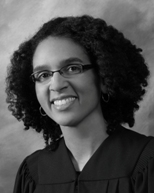
Photo: State of California
With automatic appeals to the California Supreme Court, death penalty cases are a staple of the court’s docket. However, California has not executed anyone since 2006, and in 2019 the state’s governor, Gavin Newsom, imposed an official moratorium on executions. In 2019, Kruger wrote for a unanimous court in overturning the death sentence of Jeffrey Scott Young, who was convicted of killing two people during a 2002 robbery and carjacking at an offsite parking lot near San Diego International Airport. The court agreed with Young that the jury should not have been allowed to consider evidence regarding his white supremacist beliefs and tattoos, which prosecutors had introduced during the sentencing phase of his trial to rebut evidence about his good character.
The specific evidence to which prosecutors had been responding, Kruger explained, was testimony from Young’s grandmother about, for example, “his commitment to his family and children.” Although the court did not rule out the possibility that, in a different case, evidence of a defendant’s racist beliefs could be admitted, it cannot be used, Kruger concluded, simply to demonstrate the offensiveness of those beliefs.
Kruger wrote again for a unanimous court in 2020 to throw out another death sentence, this time in the high-profile case of Scott Peterson, who was convicted and sentenced to death for the 2002 murders of his pregnant wife, Laci, and the couple’s unborn child, Conner. Kruger agreed with Peterson that the trial court had made “a series of clear and significant errors in jury selection that, under long-standing U.S. Supreme Court precedent, undermined Peterson’s right to an impartial jury at the penalty phase.” Most notably, Kruger explained, the trial court should not have dismissed potential jurors simply because they expressed general opposition to the death penalty, without also determining whether that opposition would have meant that they would be unable to follow the law and impose the death penalty if warranted. In December 2021, Peterson was resentenced to life in prison without the possibility of parole.
Bodycam footage and sexual-abuse lawsuits
Two years ago, Kruger wrote for the court in its decision holding that a California city could not charge a public-interest group seeking public records for the approximately 40 hours that city employees spent editing footage from police body cameras. A local chapter of the National Lawyers Guild sought records relating to the Hayward Police Department’s actions in the 2014 demonstrations that followed grand jury decisions not to indict the police officers involved in the deaths of Eric Garner and Michael Brown. The city of Hayward billed the group $3,000, citing a state-law provision that requires the person or group requesting electronic records to pay the costs associated with producing copies of those records when producing those copies would require the extraction of data.
The extraction of data, Kruger explained, does not cover redacting exempt material from electronic records that the city would otherwise need to disclose. That interpretation, Kruger reasoned, is more consistent with both the text of the statute and the California legislature’s intent in enacting the law. Moreover, she added, interpreting the term “extraction” to include the costs of redaction “would make it more difficult for the public to access information kept in electronic format” – contrary to the state’s constitution, which “favors an interpretation that avoids erecting such substantial financial barriers to access.”
Kruger acknowledged the city’s argument that “requests for body camera footage present unique concerns for government agencies with limited resources” because of the privacy interests involved, among other things. But this provision does not only cover body-camera footage, Kruger stressed. Instead, she noted, “it covers every type of electronic record, from garden-variety emails to large government databases.” Only the legislature, Kruger indicated, can decide whether to create special rules for body-camera footage.
Last year, Kruger wrote for the court in a unanimous decision holding that three athletes who allege that they were sexually abused by a coach as teenagers can sue USA Taekwondo but not the U.S. Olympic Committee. In her opinion, Kruger rebuffed the plaintiffs’ suggestion that the court should adopt a “more flexible and holistic approach” to determine whether a defendant can be held responsible for failing to protect a victim from harm caused by another person. “Without denying the gravity of the injuries these plaintiffs suffered,” Kruger stressed, “nor the broader problem of sexual abuse of minors in organized youth sports and other activities,” a defendant cannot be held responsible for injuries that it did not cause “unless there are special circumstances” that create a special duty for the defendant to provide protection or help to the plaintiffs.
Other notable decisions Kruger joined
In 2018, Kruger joined a unanimous decision that upheld a state law requiring new handgun models to imprint “micro stamps” inside the guns and on shell casings to make it easier for police to identify them. The National Shooting Sports Foundation, a trade association for gun manufacturers, argued that the requirement should be invalidated because it was impossible to implement the technology. The decision by Justice Goodwin Liu emphasized that the ruling did not involve the constitutionality of the requirement, but instead was simply a question of statutory interpretation. The California Supreme Court’s cases, Liu explained, have acknowledged that statutes may contain an exception when it is impossible to comply with the law when that is what the legislature intended. But in this case, Liu wrote, neither the text nor the purpose of the law indicates that, once the law went into effect, gun manufacturers may be excused from the requirement because it is impossible to comply with it.
Kruger concurred in a 2019 opinion by Chief Justice Tani Cantil-Sakauye that unanimously upheld the death sentence of a man convicted of a brutal double murder and robbery. Cantil-Sakauye’s opinion also rejected the challenge by the inmate, Thomas Potts, to the constitutionality of the state’s death-penalty scheme, as well as his contention that his more than two decades on death row constitutes cruel and unusual punishment.
Kruger did not join a concurring opinion by Liu that, while expressing “tremendous compassion for the victims and their families,” characterized the state’s death-penalty system as “an expensive and dysfunctional system that does not deliver justice or closure in a timely manner, if at all.” It is time, Liu suggested, for a discussion of the death penalty’s “effectiveness and costs.”
Kruger joined a unanimous opinion by Justice Mariano-Florentino Cuellar, another Brown appointee, abolishing the state’s cash bail system. The question came to the court in the case of Kenneth Humphrey, a 66-year-old man charged with robbery. Humphrey’s bail was initially set at $600,000 and then was reduced to $350,000 – an amount that Humphrey still could not pay. Cuellar concluded that the “common practice of conditioning freedom solely on whether an arrestee can afford bail is unconstitutional.” “Other conditions of release,” he continued, including “electronic monitoring, regular check-ins with a pretrial case manager, community housing or shelter, and drug and alcohol treatment,” can often “protect public and victim safety as well as assure the arrestee’s appearance at trial.”
A varied record in divided cases
But not all of the California Supreme Court’s opinions are unanimous. And when the court has divided, Kruger has been difficult to pigeonhole. She has sometimes joined Democratic appointees to reach an arguably “liberal” result, but at other times she has joined Republican appointees to arrive at an arguably “conservative” result.
In the 2016 case Augustus v. ABM Security Services, Kruger declined to join Cuellar’s majority opinion holding that an employer violated state labor laws by requiring its employees – security guards – to keep their radios and pagers on during their rest periods in case they were needed. Cuellar, whose ruling was joined by four other justices, reasoned that the employer’s policies “conflict with an employer’s obligation to provide breaks relieving employees of all work-related duties and employer control.”
In an opinion joined by Justice Carol Corrigan, who was named to the court by Gov. Arnold Schwarzenegger, a Republican, Kruger agreed with the majority that employers “must provide off-duty rest periods” for their employees. But, she continued, simply requiring those employees to carry a radio or a pager during their rest periods isn’t, standing alone, work – particularly when there is no evidence that the security guards’ rest periods were actually interrupted. Kruger would have sent the case back to the lower courts for them to determine whether the company’s “on-call policy actually interfered with its employees’ ability to use their rest periods as periods of rest.”
Kruger provided the key vote in 2018 in Hassell v. Bird, in which the court declined to uphold an order that would have required Yelp to remove negative reviews of a law firm from its site. A three-justice plurality, in an opinion by Cantil-Sakauye, another Schwarzenegger appointee, agreed with Yelp that requiring it to take down the reviews would violate Section 230 of the federal Communications Decency Act of 1996, which generally gives websites immunity for content created by their users. (Corrigan and Justice Ming Chin, who was appointed by Gov. Pete Wilson, a Republican, provided the other two votes for Cantil-Sakauye’s opinion.)
In a separate concurring opinion, Kruger explained that in her view it was “unnecessary to reach” the Section 230 issue. Instead, she would resolve the case on the “more basic” ground that Yelp – which had not been named as a defendant in the case – could not be required to take the review down without “its own day in court.” Kruger agreed that the majority had reached the correct result, but she emphasized that she would not weigh in on how Section 230 might apply more broadly in future cases. She reasoned that although Section 230 “has brought an end to a number of lawsuits seeking remedies for a wide range of civil wrongs accomplished through Internet postings,” “the broad sweep of section 230 remedies also has ‘troubling consequences.’” “Whether to maintain the status quo,” Kruger concluded, “is a question only Congress can decide.”
Joined by Cuellar and two other Brown appointees — Liu and Justice Joshua Groban — Kruger wrote for a 4-3 court in 2019 in throwing out a lower-court ruling that upheld a search of a car without a warrant to look for the driver’s identification. Kruger described the “central issue” before the court as “not whether the search of” the driver’s car was “consistent with the guidance given in” an earlier case, but instead whether to “continue to adhere to” that earlier decision in light of U.S. Supreme Court cases since then.
Noting that the California decision had become an outlier, Kruger observed that although the California Supreme Court’s ruling had “attempted to cordon off” the power it gave to police officers, experience had shown that in practice, the searches have come “perilously close” to full searches of the cars. There are other ways for officers to obtain the information that they need, she suggested, such as asking a driver for her name and date of birth and cross-checking that information against the Department of Motor Vehicles database.
Addressing the dissent’s argument that, without carving out an exception to the Fourth Amendment’s general warrant requirement for cases like this one, “officers may not be able to achieve absolute certainty about the identity of some subset of traffic violators before issuing traffic tickets,” Kruger countered that “the test for whether an exception should be recognized is not whether, in its absence, there might be some cost in effective enforcement of the traffic laws.” Instead, she wrote, it is “whether the tradeoff to lower that risk is worth the coin in diminished privacy.” “It is not,” she concluded, “a price we should lightly require California drivers to pay.”
In 2018, Kruger wrote for a divided court – in an opinion joined by Cantil-Sakauye, Chin, and Corrigan – in rejecting a challenge to a state law that requires law enforcement officials to collect DNA samples and fingerprints from anyone arrested for a felony. Following the U.S. Supreme Court’s 2013 decision in Maryland v. King, the majority concluded that the defendant in the case, Mark Buza, had been arrested for a serious offense – arson – and, at least as applied to him, the requirement therefore did not violate either the U.S. Constitution’s Fourth Amendment or the California constitution.
The majority did not weigh in on whether the law was valid for other defendants, and it rejected a suggestion – made by Liu and Cuellar, in dissenting opinions – that it determine whether the state can require a DNA sample before a judge determines that a defendant’s arrest was valid. Kruger stressed that the court’s holding was “limited,” and she explained that “the law teaches that we should ordinarily focus on the circumstances before us in determining whether the work of a coequal branch of government may stand or must fall.”
Kruger joined an opinion by Liu in 2019 that reinstated a challenge by psychotherapists to a state law that would require them to report to authorities patients who admit to viewing child pornography, even when the therapists don’t believe that the patients pose any harm to children. Writing for a four-justice majority, Liu acknowledged that the “proliferation of child pornography on the Internet is an urgent problem of national and international dimension,” but the court – over a dissent by Cantil-Sakauye, Chin, and Corrigan – concluded that the reporting requirement implicated an interest in privacy. Stressing that the court was not ruling that the reporting requirement was unconstitutional, Liu sent the case back to the lower courts for them to determine whether the reporting requirement actually advances the law’s purpose of protecting children, or whether it instead deters patients from seeking treatment for sexual disorders.
Kruger sided with the court’s conservative justices in a 4-3 ruling in 2017 that made it more difficult for inmates sentenced under the state’s “Three Strikes” law to obtain resentencing. In a separate concurring opinion joined by two of her colleagues, Kruger explained that the other provisions in the ballot initiative on which the inmates seeking resentencing relied reflected a “clear and exclusive focus on affording relief to individuals who have committed specified drug- and theft-related offenses, and neither the stated purposes of the proposition nor the ballot materials alerted voters to any possibility that a favorable vote might also result in a significant change to the separate statutory scheme governing the resentencing of life prisoners under the ‘Three Strikes’ law.” “Although this is certainly a choice the voters could make,” Kruger acknowledged, “I do not think we can say it is a choice the voters have already made.”
Under the California system, although Kruger was nominated by Brown and confirmed by the Commission on Judicial Appointments, she was still required to face the voters in a “retention election,” without an opponent, in 2018. Kruger won retention easily, with nearly 73% of voters – 6.6 million in total – voting “yes.”
Personal life
Kruger is married to Brian Hauck, a partner at the law firm of Jenner & Block and a former senior official in the Department of Justice during the Obama administration. The couple has two children: a son and a daughter.
When she had their daughter in 2016, Kruger became the first California Supreme Court justice to give birth while in office. A 2018 story in the Los Angeles Times recounted how Kruger traveled from the San Francisco Bay area, where she lives, to Los Angeles with her newborn to hear oral arguments; Kruger’s mother-in-law cared for the baby, then four weeks old, while Kruger was working.
If Biden nominates Kruger, it will not be his administration’s first effort to get Kruger to return to the east coast. In January, Marcia Coyle and Ryan Barber of the National Law Journal reported that Kruger had twice turned down offers to serve as the administration’s solicitor general. Like a position as a Supreme Court justice, that job requires Senate confirmation – but a job as a Supreme Court justice comes with life tenure.
*********************
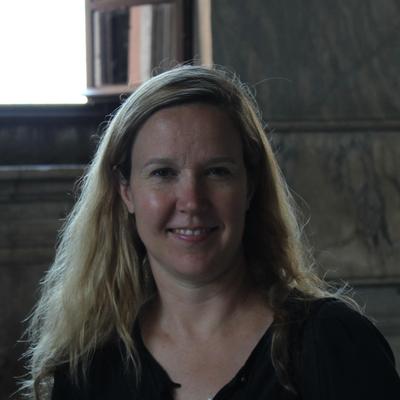
Amy Howe is the former editor and a reporter for SCOTUSblog and still is a contributor. She primarily writes for her eponymous blog, Howe on the Court.
Before turning to full-time blogging, she served as counsel in over two dozen merits cases at the Supreme Court and argued two cases there.
Amy is a graduate of the University of North Carolina at Chapel Hill and holds a master’s degree in Arab Studies and a law degree from Georgetown University.
*********************
The preceding article was previously published by SCOTUSBlog and is republished by permission.
Congress
Padilla speaks at ‘ICE Out for Good’ protest in D.C.
ICE agent killed Renee Nicole Good in Minneapolis on Jan. 7
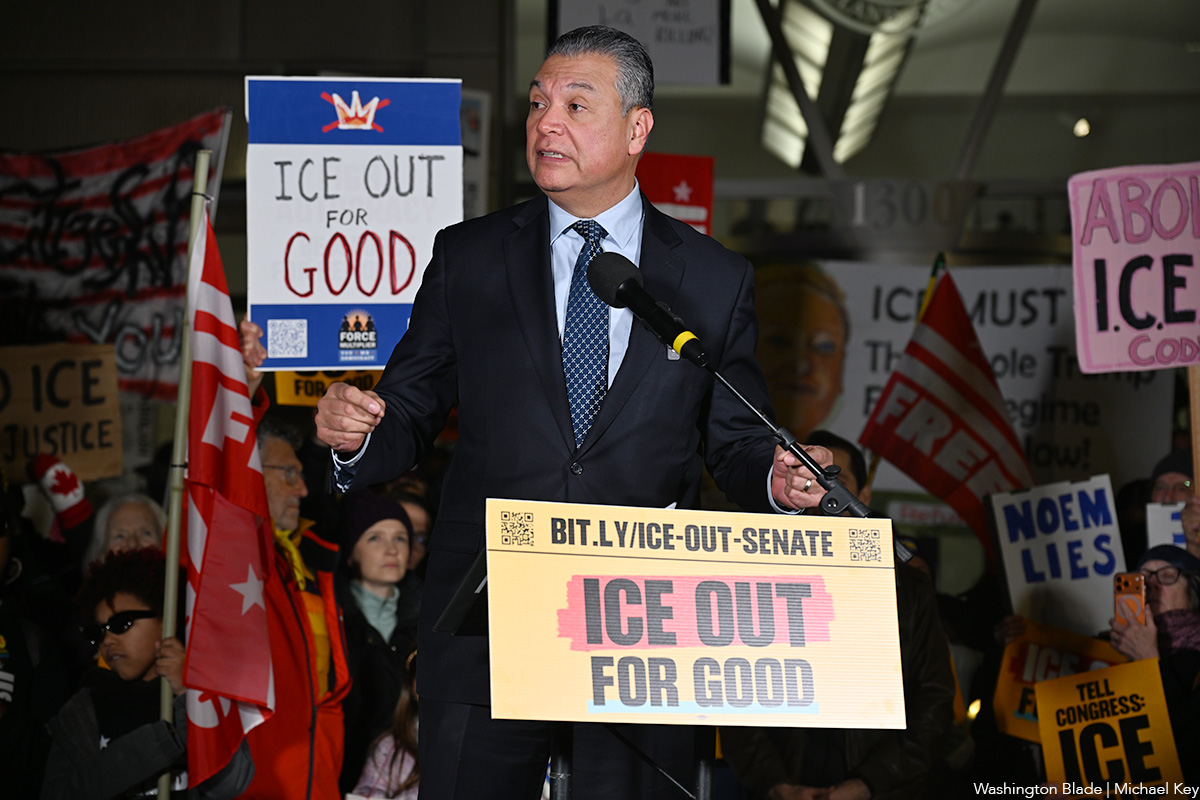
U.S. Sen. Alex Padilla (D-Md.) is among those who spoke at an “ICE Out for Good” protest that took place outside U.S. Customs and Border Protection’s headquarters in D.C. on Tuesday.
The protest took place six days after a U.S. Immigration and Customs Enforcement agent shot and killed Renee Nicole Good, a 37-year-old woman in Minneapolis.
Good left behind her wife and three children.
(Video by Michael K. Lavers)
Politics
LGBTQ Democrats say they’re ready to fight to win in 2026
Queer leaders warn Democrats not to abandon trans people
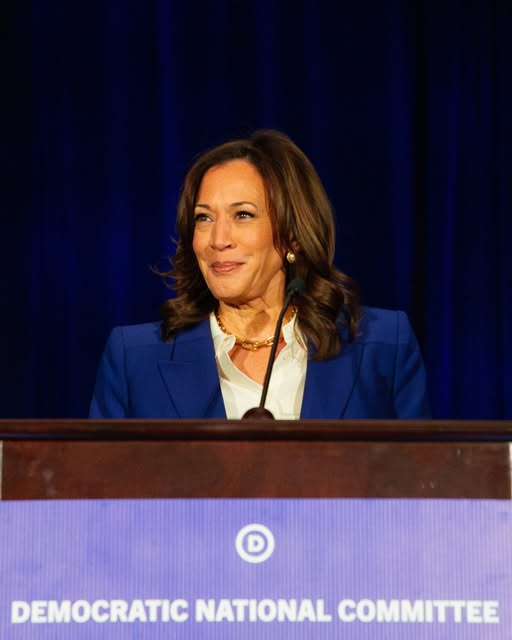
The Democratic National Committee held its annual winter meetings in Downtown Los Angeles over the weekend, and queer Democrats showed up with a clear message for the national organization: Don’t abandon queer and trans people.
Following last year’s disastrous presidential and congressional elections, many influential pundits and some powerful lawmakers called on Democrats to distance the party from unpopular positions on trans rights, in order to win swing districts by wooing more conservative voters.
But members of the DNC’s LGBTQ Caucus say that’s actually a losing strategy.
“There are still parts of our party saying we need to abandon trans people in order to win elections, which is just not provable, actually. It’s just some feelings from some old consultants in DC,” LGBTQ Caucus Chair Sean Meloy says.
Some national Democrats are already backtracking from suggestions that they walk back on trans rights.
California Governor Gavin Newsom grabbed national attention in March when he suggested that it was “deeply unfair” for trans girls to play in women’s sports. But last week, he doubled down on support for trans rights, claiming to have signed more trans-rights legislation than any governor in the country, and entering into feuds on X with Elon Musk and Nicki Minaj over his support for trans kids.
Democrats are also clearly feeling the wind in their sails recently after major election victories in Virginia and New Jersey last month, as well as victories in dozens of local and state legislative elections across the country in 2025.
“[Abigail] Spanberger in Virginia didn’t win by dodging the trans question. She won by attacking it, confronting it, and that’s how she got ahead,” says Vivian Smotherman, trans activist and at-large member of the DNC’s LGBTQ Caucus.
“Trans people are not a problem. We are a resource,” Smotherman says. “For my community, surviving into adulthood is not a guarantee, it’s an accomplishment. You don’t walk through a survival gauntlet without learning things… I’m not begging the DNC to protect my community. I’m here to remind you that we are the warriors tempered by fire, and we are fully capable of helping this party win.”
At its own meeting on Friday, the LGBTQ Caucus announced several new initiatives to ensure that queer and trans issues stay top of mind for the DNC as it gears up for the midterm elections next year.
One plan is to formalize the DNC’s Trans Advisory Board as distinct from the LGBTQ Caucus, to help introduce candidates across the country to trans people and trans issues.
“One in three people in this country know a trans person. Two-thirds of Americans don’t think they do,” Smotherman says. “So the real problem is not being trans, it’s that you don’t know us. You cannot authentically support a trans person if you’ve never met one.
“That’s why my first goal with this Trans Advisory Board is to host a monthly Meet a Trans Person webinar. Not as a spectacle, as a debate, but as a human connection, and I will be charging every state chair with asking every one of their candidates up and down the board if they know a trans person. And if that person doesn’t know a trans person, I’m gonna have that state chair put them on that webinar.”
The LGBTQ caucus is also opening up associate membership to allies who do not identify as LGBTQ, in order to broaden support and connections over queer issues.
It’s also preparing for the inevitable attacks Republicans will throw at queer candidates and supporters of LGBTQ issues.
“These attacks are going to come. You have to budget money proactively. You have to be ready to fight,” Meloy says. “There are some local party chairs who don’t want to recruit LGBTQ candidates to run because these issues might come up, right? That’s an absolutely ludicrous statement, but there are still people who need support in how to be ready and how to respond to these things that inevitably come.”
“The oldest joke is that Democrats don’t have a spine. And when they come after us, and we do not reply, we play right into that.”
Meloy also alluded to anti-LGBTQ tropes that queer people are out to harm children, and said that Democrats should be prepared to make the case that it’s actually Republicans who are protecting child abusers – for example, by suppressing the Epstein files.
“They are weak on this issue. Take the fight, empower your parties to say, ‘These people have nothing to stand on,’” Meloy says.
Politics
George Santos speaks out on prison, Trump pardon, and more
Not interested in political comeback: ‘I made so many poor choices’

It has been just over two years since George Santos — the disgraced politician who once represented New York’s Third District — was expelled from Congress. Now, Santos is breaking his silence about his expulsion, imprisonment, subsequent pardon, what he believes he did wrong, and allegations regarding immigration fraud.
In 2022, Santos was elected to represent the Long Island communities of North Hempstead, Glen Cove, and Oyster Bay, one of the wealthiest congressional districts in the United States. This week, he sat in the lobby of the Hyatt Capitol Hill, just blocks from his former office in the Cannon House Office Building, to speak with the Washington Blade about how he became the center of one of the most outrageous political scandals in modern U.S. history. Despite the media scrutiny surrounding his lies, criminal convictions, and eventual pardon by President Donald Trump, Santos appeared relaxed during the interview, speaking freely about his experiences, admissions, and grievances.
Scope of Santos’s misconduct
Many journalists have struggled to verify George Santos’s personal history and professional resume. Numerous claims he made during his campaigns have been debunked or walked back, particularly regarding his personal and professional history since 2020.
Santos gained media attention for claiming Jewish heritage despite being raised Catholic and identifying as Catholic. He said his maternal grandfather grew up Jewish, converted to Catholicism before the Holocaust, and raised his children Catholic. Investigations, however, show his maternal grandparents were born in Brazil, not Ukraine or Belgium. Santos described himself variously as “Jew-ish,” “half Jewish,” a non-observant Jew, a “proud American Jew,” and a “Latino Jew.”
He also misrepresented his mother’s professional history, claiming she was “the first female executive at a major financial institution.” Records, including her 2003 visa application, show she had not been in the U.S. since 1999 and listed her occupation as a domestic worker.
Santos further fabricated his educational history, claiming a bachelor’s degree in finance and economics from Baruch College, where he said he graduated near the top of his class. Investigations revealed he never graduated. He also falsely claimed an MBA from New York University on official campaign documents — a misrepresentation that later became grounds for his expulsion. Santos later blamed the lies on a local Republican Party staffer.
His professional claims were also fraudulent. Santos called himself a “seasoned Wall Street financier and investor” and claimed to have worked for Citigroup and Goldman Sachs. Both companies reported no record of his employment. When pressed, Santos admitted he had used a “poor choice of words,” eventually describing his experience as “limited partnerships.” He also falsely claimed to have lost four employees in the 2016 Pulse nightclub shooting in Orlando; no victims had any connection to companies listed in his biography.
Santos misrepresented his residences during his 2020 campaign. He listed an Elmhurst, Queens, address outside the district he sought to represent, later moving with his partner to a Whitestone rowhouse. He was registered to vote at the Whitestone address but did not live there.
When asked about his lies, Santos told the Blade he wishes he did everything differently.
“Everything, everything, everything,” Santos told the Blade. “I made so many poor choices that I think it would be redundant to not say everything.”
He did not fully take responsibility, describing the scandals as a mix of personal ambition and what he called a “sensational political assassination.”
“Ambition is a toxic trait, and unfortunately, I was consumed by that. I forewent everyone else’s [considerations]… I had no consideration for anything around me other than myself, and that’s awful,” he added.
In addition to personal history fabrications, Santos made numerous false claims the Department of Justice later treated as campaign finance fraud. He solicited donations through a fake political entity, diverted funds into an LLC he controlled, and disguised personal expenditures as legitimate political expenses, using donations for luxury purchases.
Santos denied wrongdoing, stating, “I didn’t steal people’s credit cards… I didn’t go shopping at Hermes and Onlyfans. It’s not true either.”
He defended some purchases as campaign-related, singling out House Ethics Committee Chairman Michael Guest.
“The only two luxury brands that you’ll see of purchases in my campaign were Ferragamo and Tiffany. [I got] Ferragamo for the [male members of the] Republican steering committee when I was lobbying for my seat committee and three Tiffany pens for the females … That’s where those are legal expenses. They’re very legal.”
The House Ethics Committee found “substantial evidence” of lawbreaking, stating Santos “fraudulently exploited every aspect of his House candidacy,” using campaign funds for luxury shopping, cosmetic procedures, travel, and rent.
“I had a choice to not straw donate to my campaign, and I chose to, yeah, that was a poor choice,” Santos admitted. “Of course, I’m guilty for that. Was I forthcoming in the GOP with the party? No, I was not. I was very dishonest with the GOP, and for that I regret, and I also regret that the GOP in New York created an environment that made somebody like me feel it was needed to do that. But I regret not being forthcoming and honest about it.”
Santos also collected pandemic unemployment payments of approximately $24,000 while employed.
He was charged with multiple federal offenses, including conspiracy to commit offenses against the United States, wire fraud, making materially false statements to the FEC, falsifying records, aggravated identity theft, access device fraud, money laundering, and theft of public funds. Santos pleaded guilty to wire fraud and aggravated identity theft and was sentenced to 87 months in prison in April 2025, ordered to pay hundreds of thousands in restitution and forfeiture. He was released from the Federal Correctional Institution in Fairton, N. J., following Trump’s pardon in October.
Immigration fraud allegations

In addition to the professional and personal claims Santos has made that have been proven false, he also addressed allegations of immigration fraud raised by the Washington Blade. A source familiar with Santos’s history with U.S. immigration proceedings described several alarming allegations, most notably a reportedly fraudulent marriage to his former wife, Uadla Viera, to help her obtain U.S. immigration status. Santos has adamantly denied wrongdoing.
According to the source, who spoke to the Blade on condition of anonymity, Santos married Viera in a civil ceremony in Manhattan in 2012, despite neither living in the city. There are no known photos, announcements, or records of a wedding celebration, engagement, bridal party, shower, or honeymoon. This unusual lack of documentation stands out for Santos, whose life and actions are typically geared toward media attention.
While the source questioned the motive behind the marriage, Santos insisted it was legal and not done for any nefarious purpose.
“I married a person who was legally in this country, and all in all, what I did was kind of skip the line for her. And we were married, and there was no financial benefit [for me]. We were married. We had bills together. There’s no proof or evidence of a financial benefit other than jaded people again, anonymously, lying saying ‘He got paid. He offered me money.’ First of all, I don’t even have the wherewithal for that. Second of all, we went through a very rigorous — fucking rigorous — immigration litmus test, house interviews, multiple layers of interviews, a consummate marriage that was very obvious for anybody who was around us, and then I ended up cheating for now, obvious reasons.”
In 2013, the source said Santos dated Leandro Bis, a Brazilian tourist, while still married to Vieira. Santos denies this, framing the period as tumultuous and asserting that he was merely helping someone in need who now falsely alleges more. Bis told ABC News in a 2023 interview that Santos had “promised the world” to him while they dated.
“I’ve never dated a Leandro,” Santos told the Blade. “I can’t believe that six months of my life are common stories in the New York Times. This lunatic is going on TV and putting himself out there…I look so much better than him, and I’m much older than him. I mean life does numbers on people, because hate is a virus.”
The source further recounted Santos’s interactions with Greg Morey-Parker, a former roommate of Santos’s who told CNN that he was suspicious of Santos’s academic resume and stories of family wealth.
“Greg Morey-Parker is not a boyfriend– nowhere near a boyfriend,” Santos told the Blade. “He was actually a homeless Starbucks barista that I felt bad for. Let him crash in my living room. … He accused me of stealing his Burberry scarf. You’re homeless and you have a Burberry scarf? Bro, make up your fucking mind.”
In 2014, Santos met Pedro Vilarva, 18, on Tinder and dated him for a year while still married to Viera. According to the source, the trio socialized frequently: Santos and Vilarva with other gay men, Viera with heterosexuals. That same year, Santos filed a family-based immigration petition for Viera, who was granted conditional permanent residency. Santos publicly celebrated his engagement to Vilarva in a Facebook post at La Bonne Soupe, a Manhattan restaurant, though the relationship eventually ended. That Facebook post has since been deleted.
Santos maintains he was honest with both immigration authorities and his spouse.
“I was honest with immigration authorities, 100% above board. I was honest with my spouse, as far as my relationship with him and with my ex-wife, so much I’m the one who told her, I’m sorry we can’t do this anymore. I’m seeing Pedro. And she knew Pedro, it was a shit show. Okay? I’m gonna leave it at that, out of respect to both her and Pedro … I cheated on my first wife, and that was a whole story on its own.”
Later in 2014, Santos met Morey-Parker, who told the Daily Beast that Santos advised him to marry an immigrant woman from Brazil to make money. Santos denied that claim to the Blade.
“That is Gregory again making more shit up and there’s no proof or evidence or anything that you can point to,” Santos said.
Viera became a permanent resident in 2017, according to previous media reports, and in 2018 gave birth to a daughter. Santos did not claim paternity or seek custody. Santos and Viera were granted an uncontested divorce in 2019. Viera became a U.S. citizen in 2022 and purchased a $750,000 home in New Jersey, according to the Blade’s source and to the official deed of the property.
Santos did not mention that he had been married or divorced during his congressional campaigns until an internal vulnerability study commissioned by the campaign identified it as a potential issue for voters.
Santos downplayed all of this, saying it was a running joke among his staff. “I would be a joke. I would allude to it [and say] ‘Ladies, look, I love you guys, but there’s a reason that I don’t date women anymore, and I’m divorced from my first wife.’ It was like a running joke, making light of it and self-deprecating humor, which is my favorite kind of humor.”
He claimed that the New York Times story was the reason he became more sensitive with posts related to his ex-wife.
“The reason it’s not [visible] today is because I pulled it all off because of privacy issues. It was all archived for my Instagram, but if you had access to my Instagram prior to the New York Times story, you would see I never deleted my pictures with her…They were all over my Instagram, going to the beach, like everything. It’s like our entire life was documented together.”
On Trump, politics, and public office
Santos was tight lipped when the Blade questioned him about his conversations with President Trump.
“You never, ever share a lick of a word you exchange with the sitting president of the United States, no matter who that person is… I’ve seen it backfire for people who did it with Biden, with Trump, with Obama. I’m not about to make that mistake. Yeah, my conversations with the president are private.”
He did say that he was humbled by Trump’s pardon but regrets ever entering politics.
“I had such a good life, and to have to be at the place I am today is indicative of, you know, politics is really for the elites…I’m so uninterested in politics these days…I want to get involved in policy change, but not politicking.”
He said he is not interested in a position in the Trump administration.
“I would respectfully decline [any government job], I would say thank you from the bottom of my heart, and say ‘I’m probably not best suited for a job in government.’ I want nothing to do with the government or public office.”
Trans and LGBTQ issues

Santos also spoke on his experience as both a member of the LGBTQ community and a Republican legislator. Most notably, he doesn’t think there is any barrier for gay people to join the Republican Party, citing his ascent into Republican leadership as an example.
He defended his record as a gay Republican, noting the continued election and reelection of LGBTQ members of Congress and emphasizing that he disproved stereotypes about Republicans.
“There’s no bigotry in the Republican Party. It’s a matter of how you present yourself…I’m not saying there’s no anti-gay sentiment, I’m pretty sure there is, but I never experienced it.”
He continued, explaining how far-right figures gaining prominence within Republican circles sets off some tension.
“I know it exists… I mean Nick Fuentes exists, right? His followers go on my social media, and either call me a Jew or a homo all day long. But I’m proud of it. I’m proud that I was the first who didn’t conceal the fact that he’s gay, and still got elected by a constituency of Republicans in a landslide victory.”
It is important to note that Santos is the first openly LGBTQ non-incumbent Republican to be elected to Congress, not the first openly LGBTQ Republican to win an office. Santos won his seat with 53% of his district’s vote while his opponent, Robert Zimmerman, got 46%.
Santos spoke on his experience as a gay man, echoing other LGB Republicans who have distanced themselves from transgender rights.
“This is very controversial for me, but I don’t loop my issues in with the trans community issues. I’m a gay man. I’m gender conforming. I’m he/him/sir.”
He continued, saying all he can speak on is his experience as a gay man, which doesn’t inherently lend him to being a champion for transgender rights, unlike many other LGB elected officials have done.
“I’ve never walked in the shoes of a trans person, so I can’t speak for them.” Santos framed his stance on gender-affirming care carefully: “I believe those people deserve the right to treatment, and that’s fair. I don’t believe in a mass agenda of pushing children towards that. I think we need to have a sensible conversation of, let’s allow kids to get to a certain age, right? Let’s allow adults to make those decisions, not children…for permanent decisions like hormone blockers and puberty blockers…that should be with adults.”
This is despite general medical consensus that views gender-affirming care as medically necessary, appropriate, and potentially life-saving for trans youth. The American Medical Association, the largest medical association in the country, opposes state laws that interfere with or ban gender-affirming care, calling such actions harmful and contrary to medical evidence.
Prison experience
Santos also spoke explicitly about what he says are dehumanizing conditions at FCI Fairton, something that has given him a new passion following his release from the facility.
“It’s punitive and dehumanizing,” he said when describing the situation he was in.
“Black mold bubbling all over the ceiling. Rat infestations… Listeria and ringworm outbreaks. Expired food… Underwear with skid marks… either wear that or don’t wear underwear.”
He continued, emphasizing the dehumanizing treatment he says he received, and hoping it will lead to prison reform.
“Solitary confinement for 41 days. Three showers a week. One 15-minute phone call every 30 days. [The warden] an absolute vicious human being. … We need to rehabilitate people. Just make it humane.”
Santos hinted at a future in media and activism, particularly related to prison reform, signaling that while he has stepped away from public office, he may still seek to influence policy and public discourse.
Despite his dramatic fall from political grace, Santos remains unapologetically in the public eye. From allegations of fraud to his prison experience and ongoing controversies, he presents a portrait of a man both shaped by — and defiant of — the consequences of his actions. Whether the public views him as a cautionary tale, a redeemed figure, or something in between, Santos’s story continues to provoke debate about accountability, ambition, and the limits of political power in America.
Politics
Honoring Stonewall: A conversation with Senator Toni Atkins on the past, present, and future of Pride
As we commemorate the 50th anniversary of the Stonewall Uprising, the Stonewall Democratic Club honors leaders like Senator Toni Atkins, whose lifelong commitment to equality and public service reflects the enduring legacy and ongoing promise of Stonewall
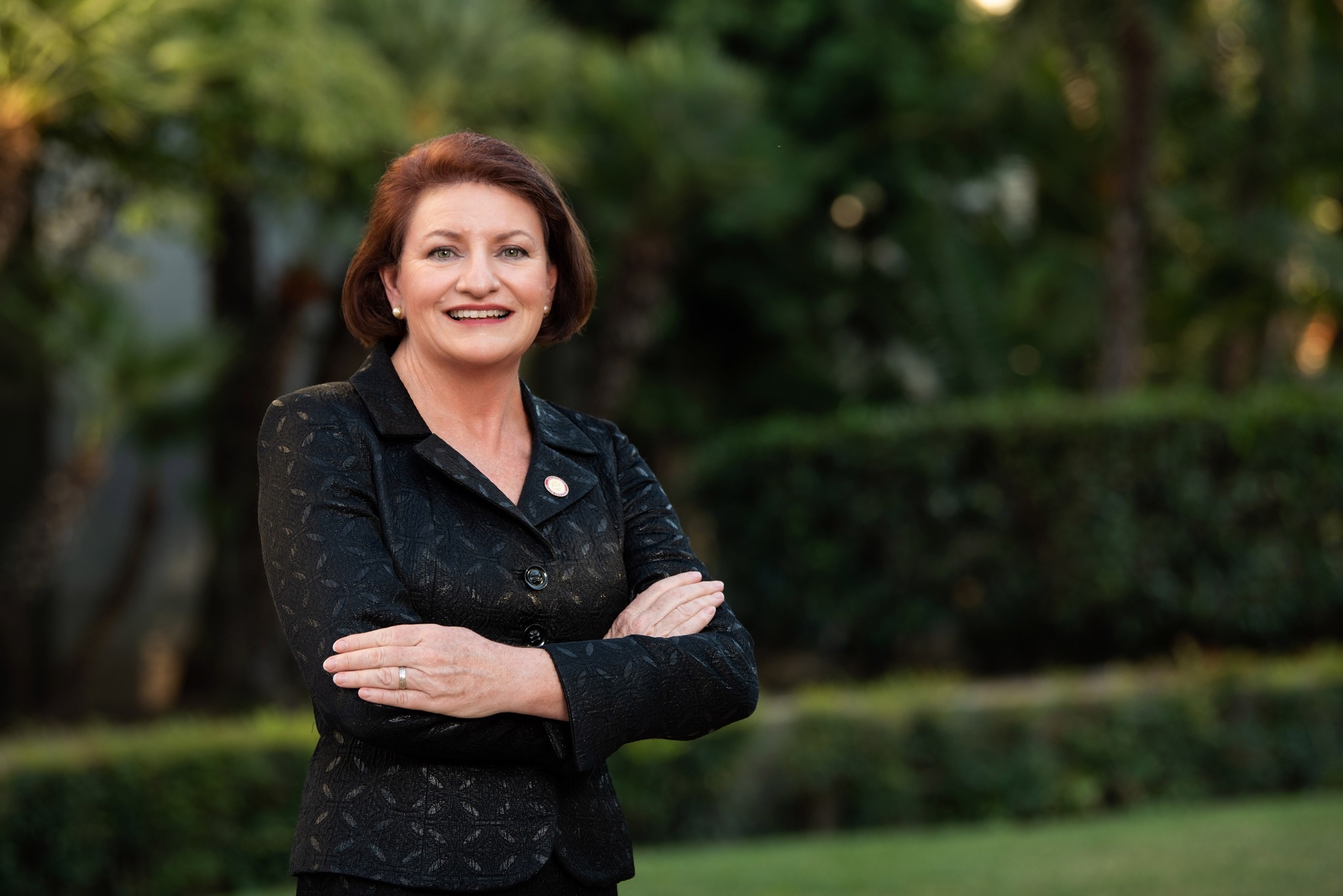
As we rapidly approach the 50th anniversary of the Stonewall Uprising – an inarguably paramount moment that fueled a national movement for LGBTQ civil rights – the Stonewall Democratic Club continues to carry into the future the spirit of that rebellion through advocacy and political action. This milestone also provides our community with an opportunity to reflect on the leaders who have carried that spirit forward, including Senator Toni Atkins, whose decades of public service have been shaped by a resounding commitment to equality and representation of marginalized communities. Her journey, from growing up in rural poverty to becoming one of California’s most impactful legislative leaders, embodies the progress made since Stonewall and the work that still lies ahead for us.
As our community and our country approach the 50th anniversary of the Stonewall Uprising, how does that milestone resonate with you personally, politically, or otherwise?
Personally, I came out at age 17 in a very conservative rural community. I didn’t see other people like me, and I didn’t believe society was built for someone like me. So I am simply grateful to have been part of our movement for civil rights for my LGBTQ+ community. Politically, we have made tremendous gains, and we now face a very intentional and serious backlash. Our work and political engagement are more important than ever.
In your opinion, what do you believe was the most significant achievement that came from Stonewall? What unfinished business do we still have to work on?
The most significant achievement was visibility – seeing our collective strength for the first time.
Today, we must fight to regain the ability to serve openly in the military, protect marriage equality, and hold our hard-won ground. We must continue educating allies and families about the lives and experiences of nonbinary and transgender community members. In many ways, we are refighting some of the same battles.
We also have to work in partnership with other marginalized communities on issues beyond civil rights – income inequality, access to healthcare (including gender-affirming care), educational opportunities, and affordability. The struggle for justice is interconnected.
How do you view the connection between the activism of that time in our country and the modern policy work of the California Legislature?
Activism and organizing were essential then, and they remain essential today. We still have to strategize, organize, and take action. That hasn’t changed.
You have had a long and devoted career in public service in California. What first inspired you to get into politics? How have your own experiences as a queer woman shaped your journey along the way?
Our stories – every one of them – matter. My history has shaped every policy issue I’ve worked on. I grew up in a working-poor family. My parents, three siblings, and I lived in a four-room house with no indoor plumbing. We carried water from a nearby spring to drink, cook with, and bathe. We lacked consistent healthcare. My father was a lead miner; my mother worked as a seamstress in a factory.
Coming out as a lesbian at a young age was another defining part of my story. All of this influenced my work on housing, healthcare, LGBTQ rights, the environment, and labor protections. I saw firsthand how the mines destroyed the environment, how little safety, benefits, or protections my father had, and how families like mine struggled. Much of my political work has been about empowerment – for myself, my family, and others facing similar obstacles.
I entered politics by helping my mentor, Christine Kehoe, get elected to the San Diego City Council in 1993 – the first openly LGBTQ candidate elected to that body. Working with her at City Hall showed me the difference we could make when we had a seat at the table. That was my motivation – not only for the LGBTQ community but for all marginalized communities, working families, and women. I am forever grateful to Chris for giving me a chance to serve.
What moments in your legislative or leadership roles shine brightest in your mind as being most impactful to you?
So many- the Gender Recognition Act, Proposition 1, which I authored to enshrine abortion and contraception into the California Constitution, and Proposition 3, which did the same for marriage equality. The Earned Income Tax Credit (EITC) for working individuals and families. Creating a permanent source of funds for affordable housing. The California Dream For All downpayment assistance loan for people to buy their first home. Support for funding Prep and for community clinics and Planned Parenthood. Increased funding for childcare for working families and increased paid family leave! So many issues and so much good can be done through public policy and budget actions. That is the importance of the political work of the LGBTQ community and our allies!
As the former Speaker and as President ProTem – I have had the ability not just to sit at that table but to actually set the agenda. I’m grateful and honored for the opportunity.
Over the years you have spent in politics, how has your sense of “why I do this work” evolved, particularly in relation to our queer community and broader social justice aims?
I have seen how strategy, organizing, fundraising, and activism empower us to influence policy and budget decisions rooted in shared values. Relationships also matter – the ones we build, the conversations we have, and the listening we do. Those connections make us better and more effective.
Decades ago, we relied heavily on allies because we didn’t have seats at the table ourselves. We must never forget that. There is no shortcut for the crucial, ongoing conversations needed to continue advancing equality.
How would you describe the state of queer rights and representation in California today?
California’s values – in the public and in the Legislature – largely reflect strong support for our community. Still, especially regarding trans rights, we must keep engaging allies and others about who we are as nonbinary and transgender individuals. That is the next frontier of our civil-rights journey.
And our LGBTQ Caucus has never been larger or more effective. Many members, as I once was, are now in positions of real power and influence, moving forward policies that support our community.
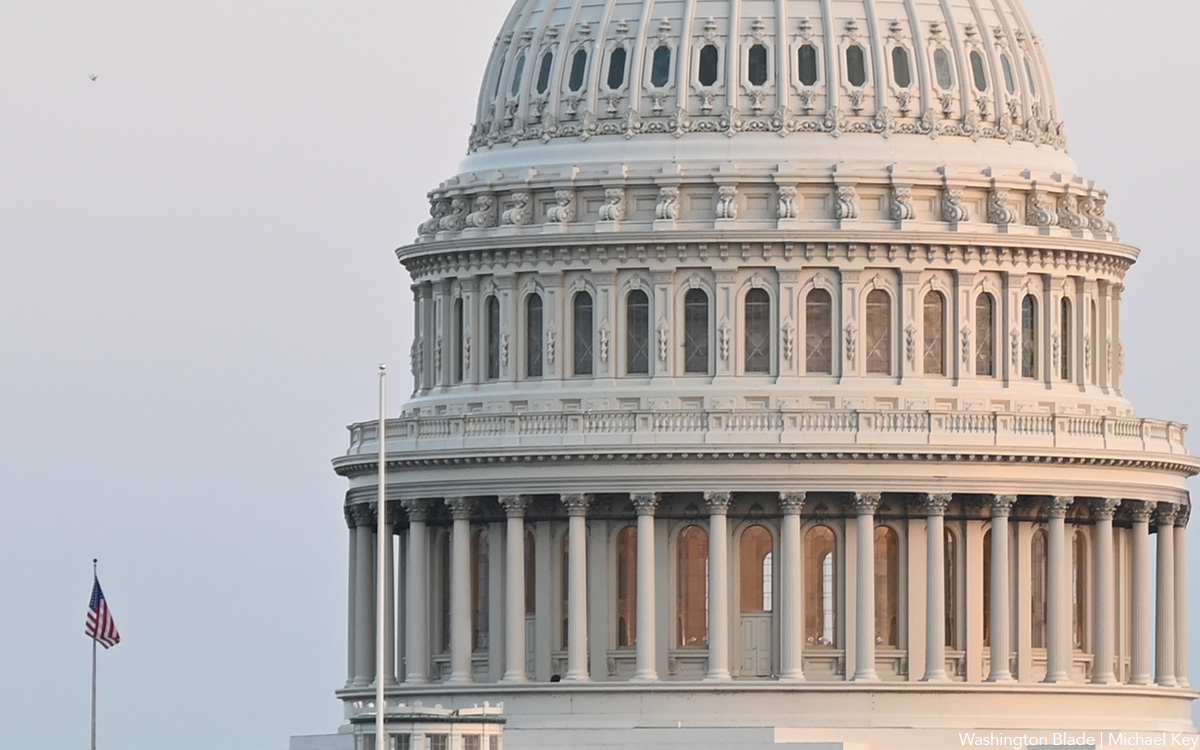
President Donald Trump on Wednesday signed a bill that reopens the federal government.
Six Democrats — U.S. Reps. Jared Golden (D-Maine), Marie Gluesenkamp Perez (D-Wash.), Adam Gray (D-Calif.), Don Davis (D-N.C.), Henry Cuellar (D-Texas), and Tom Suozzi (D-N.Y.) — voted for the funding bill that passed in the U.S. House of Representatives. Two Republicans — Thomas Massie (R-Ky.) and Greg Steube (R-Fla.) — opposed it.
The 43-day shutdown is over after eight Democratic senators gave in to Republicans’ push to roll back parts of the Affordable Care Act. According to CNBC, the average ACA recipient could see premiums more than double in 2026, and about one in 10 enrollees could lose a premium tax credit altogether.
These eight senators — U.S. Sens. Catherine Cortez Masto (D-Nev.), Dick Durbin (D-Ill.), John Fetterman (D-Pa.), Maggie Hassan (D-N.H.), Tim Kaine (D-Va.), Angus King (I-Maine), Jacky Rosen (D-Nev.), and Jeanne Shaheen (D-N.H.) — sided with Republicans to pass legislation reopening the government for a set number of days. They emphasized that their primary goal was to reopen the government, with discussions about ACA tax credits to continue afterward.
None of the senators who supported the deal are up for reelection.
King said on Sunday night that the Senate deal represents “a victory” because it gives Democrats “an opportunity” to extend ACA tax credits, now that Senate Republican leaders have agreed to hold a vote on the issue in December. (The House has not made any similar commitment.)
The government’s reopening also brought a win for Democrats’ other priorities: Arizona Congresswoman Adelita Grijalva was sworn in after a record-breaking delay in swearing in, eventually becoming the 218th signer of a discharge petition to release the Epstein files.
This story is being updated as more information becomes available.

Former Vice President Dick Cheney died of complications from pneumonia and cardio and vascular disease, according to a family statement released Tuesday morning. He was 84.
Cheney served as vice president under President George W. Bush for eight years and previously as defense secretary under President George H.W. Bush. He also served as a House member from Wyoming and as White House chief of staff for President Gerald Ford.
“Dick Cheney was a great and good man who taught his children and grandchildren to love our country, and to live lives of courage, honor, love, kindness, and fly fishing,” his family said in a statement. “We are grateful beyond measure for all Dick Cheney did for our country. And we are blessed beyond measure to have loved and been loved by this noble giant of a man.”
Cheney had a complicated history on LGBTQ+ issues; he and wife Lynne had two daughters, Liz Cheney and Mary Cheney, who’s a lesbian. Mary Cheney was criticized by LGBTQ+ advocates for not joining the fight against President George W. Bush’s push for a constitutional amendment banning gay marriage. She later resumed support for LGBTQ+ issues in 2009, including same-sex marriage, after her father left office in 2009. She married her partner since 1992, Heather Poe, in 2012.
In 2010, after leaving office, Cheney predicted “Don’t Ask, Don’t Tell” would “be changed” and expressed support for reconsideration of the law banning open military service.
In 2013, the Cheney family’s disagreements over marriage equality spilled into the public eye after Liz Cheney announced her opposition to same-sex couples legally marrying. Mary Cheney took to Facebook to rebuke her sister: “Liz – this isn’t just an issue on which we disagree – you’re just wrong – and on the wrong side of history.” Dick and Lynne Cheney were supporters of marriage equality by 2013. Liz Cheney eventually came around years later.
Cheney, a neo-con, was often criticized for his handling of the Iraq war. He was considered one of the most powerful and domineering vice presidents of the modern era. He disappeared from public life for years but re-emerged to help Liz Cheney in her House re-election bid after she clashed with President Trump. Dick Cheney assailed Trump in a campaign video and later Liz announced that her father would vote for Kamala Harris in the 2024 presidential election.
State Department
State Department’s 2024 human rights report could jeopardize LGBTQ+ asylum cases
‘Targeted and malicious act’ will ‘directly endanger lives’
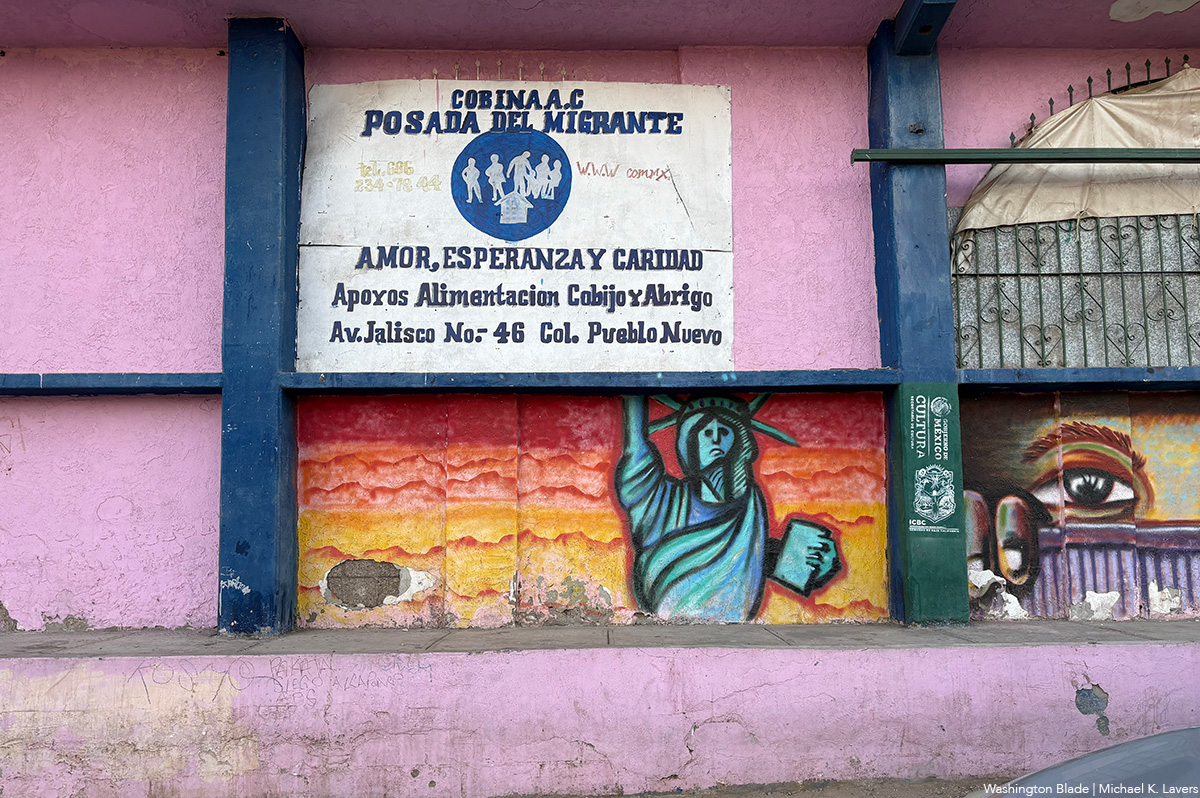
Advocacy groups say the State Department’s 2024 human rights report that “erased” LGBTQ+ people will jeopardize the cases of those who are seeking asylum in the U.S.
Immigration Equality notes the report “serve as key evidence for asylum seekers, attorneys, judges, and advocates who rely on them to assess human rights conditions and protection claims worldwide.”
The 2024 report the State Department released on Aug. 12 did not include LGBTQ+-specific references. Immigration Equality Director of Law and Policy Bridget Crawford in a statement said country-specific reports within the larger report “should be accurate, fact-based, and reflect the lived reality of LGBTQ people — not ignore and actively hide it.”
“When adjudicators see less information in these reports than in prior years, they may wrongly assume conditions have improved,” said Crawford. “In truth, the absence of reporting is a purely political move, not based in fact or reality.”
Organization for Refuge, Asylum and Migration Executive Director Steve Roth in a statement condemned the Trump-Vance administration’s “deliberate erasure of LGBTIQ communities from the 2024 human rights report — an unprecedented move that violates international standards.”
“This is a targeted and malicious act that will directly endanger lives,” he said.
Roth, like Immigration Equality, noted courts “around the world rely on these reports to evaluate asylum claims.”
“Stripping out documentation of LGBTIQ persecution removes a vital tool in assessing claims for protection, jeopardizing the ability of LGBTIQ asylum seekers to access safety,” said Roth.
Congress requires the State Department to release a human rights report each year.
The State Department usually releases them in the spring, as opposed to August. Then-State Department spokesperson Tammy Bruce, who president Donald Trump has nominated to become deputy representative at the U.N., during her last press briefing on Aug. 12 defended the delay and the report itself.
“We weren’t going to release something compiled and written by the previous administration,” said Bruce. “It needed to change based on the point of view and the vision of the Trump administration, and so those changes were made.”
Asylum courts ‘will have less credible data to rely on’
Jessica Stern, the former special U.S. envoy for the promotion of LGBTQ+ and intersex rights under the Biden-Harris administration, co-founded the Alliance for Diplomacy and Justice with several other former State Department officials.
The Alliance for Diplomacy and Justice in response to the report said the U.S. has “betrayed the trust of human rights defenders who risked their safety to share the truth” and added “some (of them) are now less safe.”
“Asylum courts in the U.S. and globally will have less credible data to rely on,” said the group.
Human Rights Watch echoed the Alliance for Diplomacy and Justice.
“The human rights report has been used in U.S. asylum court cases to show that an asylum seeker could not be returned to a country where similarly situated people were being persecuted,” said Human Rights Watch in response to the 2024 report. “That essential resource for keeping people safe is not only no longer reliable or helpful, but in some cases could put people at risk by denying abuses in places where the United States or other countries intend to deport asylum seekers and immigrants.”
State Department
LGBTQ people ‘erased’ from State Department’s 2024 human rights report
Document released Tuesday after months of delay

Advocacy groups on Tuesday sharply criticized the removal LGBTQ-specific references from the State Department’s 2024 human rights report.
The report, which the State Department released on Tuesday, does not reference Uganda’s Anti-Homosexuality Law and the impact it has had on the country’s LGBTQ community since President Yoweri Museveni signed it in 2023. The report, however, does note Ugandan government officials “reportedly committed acts of sexual violence.”
“NGOs reported police medical staff subjected at least 15 persons to forced anal examinations following their arrests,” it reads. “Opposition protesters stated security forces used or threatened to use forced anal examinations during interrogations.”
Uganda is among the dozens of countries in which consensual same-sex sexual relations remain criminalized. Authorities in the African country often use so-called anal tests to determine whether someone has engaged in homosexuality.
The report does not mention that Brazil has the highest number of reported murders of transgender people in the world. It does, however, note the President Luiz Inácio Lula da Silva in 2024 “undermined democratic debate by restricting access to online content deemed to ‘undermine democracy,’ disproportionately suppressing the speech of supporters of former President Jair Bolsonaro as well as journalists and elected politicians, often in secret proceedings that lacked due process guarantees.”
The report says there “were no credible reports of significant human rights abuses” in Hungary in 2024, even though Prime Minister Viktor Orbán’s government continued its anti-LGBTQ rights crackdown. The report does note Russian authorities last year “invoked a law prohibiting the distribution of ‘propaganda on nontraditional sexual relations’ to children.”
The State Department’s 2023 human rights report specifically notes a Russian law “prohibited gender transition procedures and gender-affirming care … and authorities used laws prohibiting the promotion of ‘non-traditional sexual relations’ to justify the arbitrary arrest of LGBTQI+ persons.” The 2023 report also cites reports that “state actors committed violence against LGBTQI+ individuals based on their sexual orientation or gender identity, particularly in Chechnya” and “government agents attacked, harassed, and threatened LGBTQI+ activists.”
“There were instances of non-state actor violence targeting LGBTQI+ persons and of police often failing to respond adequately to such incidents,” it adds.
The 2024 report does not mention Thai lawmakers last year approved a bill that extended marriage rights to same-sex couples. Gays and lesbians began to legally marry in the country in January.
Jessica Stern, the former special U.S. envoy for the promotion of LGBTQ and intersex rights under the Biden-Harris administration who co-founded the Alliance for Diplomacy and Justice, during a conference call with reporters on Tuesday said she and her colleagues “expected (the report) to be bad.”
“When we saw what the administration released, the truth is we were shocked and horrified,” said Stern.
Stern added the Trump-Vance administration “has erased or watered-down entire categories of abuse against people of African descent, indigenous people, Roma people, members of other marginalized racial and ethnic communities, workers, women and girls, and LGBTQI+ people.”
“It is deliberate erasure,” said Stern.
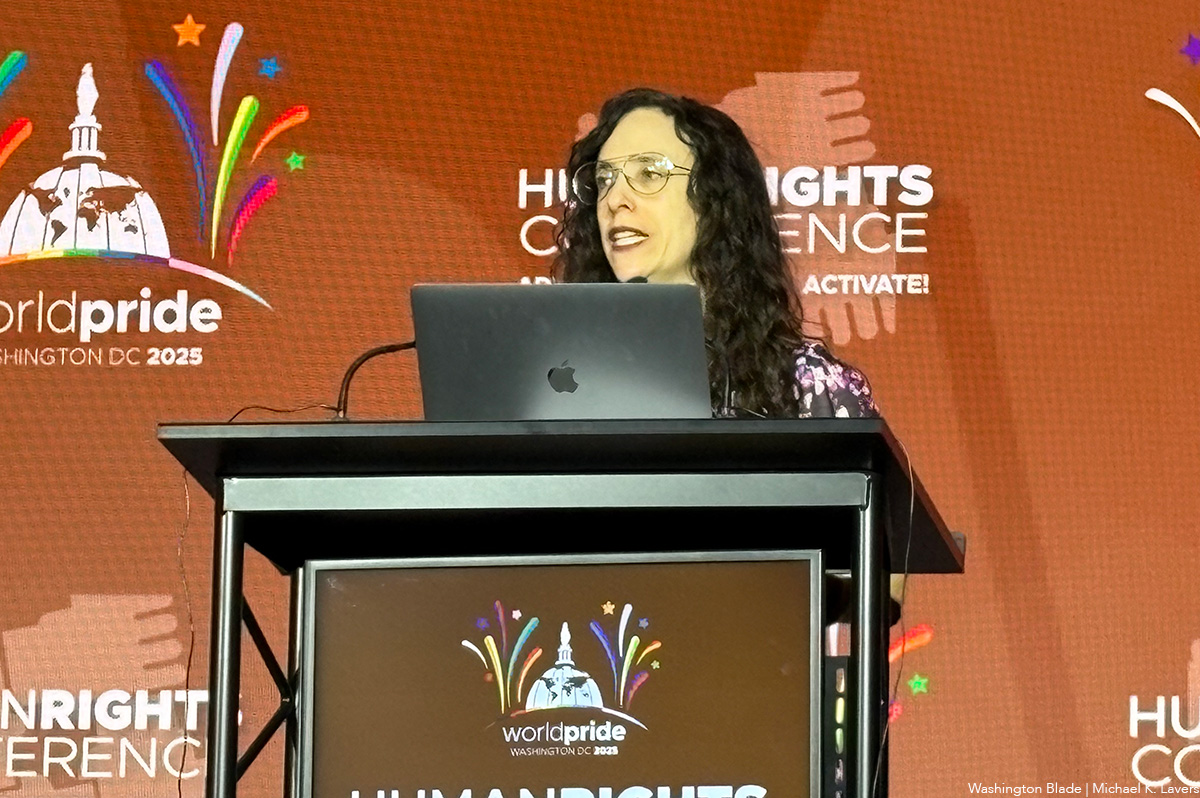
The Council for Global Equality in a statement condemned “the drastic restructuring and glaring omission of violence and abuse targeting lesbian, gay, bisexual, transgender, queer, and intersex (LGBTQI+) persons in the U.S.”
“We denounce the Trump administration’s efforts to politicize the State Department’s annual human rights reports by stripping longstanding references to human rights abuses targeting LGBTQI+ and other marginalized groups,” said Mark Bromley, the group’s co-chair.
Gay U.S. Rep. Mark Takano (D-Calif.), who chairs the Congressional Equality Caucus, echoed Bromley and Stern.
“Omitting the persecution of LGBTQI+ people from the human rights reports doesn’t erase the abuse, violence, and criminalization our community is facing around the world — it condones it,” said Takano in a statement.
“Erasing our community from these reports makes it that much harder for human rights advocates, the press, and the American people to be aware of the abuses LGBTQI+ people are facing worldwide,” he added.
Congress requires the State Department to release a human rights report each year. Foggy Bottom usually releases it in the spring.
Politico in March reported the Trump-Vance administration planned to cut “sections about the rights of women, the disabled, the LGBTQ+ community, and more” from the human rights report. State Department spokesperson Tammy Bruce, who President Donald Trump has nominated to become deputy representative at the U.N., on Tuesday during her last press briefing defended the report and the delay in releasing it.
“We weren’t going to release something compiled and written by the previous administration,” said Bruce. “It needed to change based on the point of view and the vision of the Trump administration, and so those changes were made.”
“It certainly promotes, as does our work, a respect for human rights around the globe,” added the former Fox News contributor who has described herself as a “gay woman.”
The Council for Global Equality and Democracy Forward has filed a Freedom of Information Act lawsuit. A press release notes it is “seeking the release of additional information … including any instructions provided by political appointees to strip references to abuses against LGBTQI+ persons from the reports.”
“The reports make LGBTQI+ persons and other minorities invisible and, in so doing, they undermine the human rights landscape that protects all of us,” said Bromley.
“Erasing our community from these reports makes it that much harder for human rights advocates, the press, and the American people to be aware of the abuses LGBTQI+ people are facing worldwide,” added Takano. “Failing to rectify this censorship will have real — and potentially deadly — consequences for LGBTQI+ people, including both for those who travel abroad from the U.S. and for LGBTQI+ people in countries whose leadership no longer need to worry about consequences for their human rights abuses. The State Department must reverse course and restore the LGBTQI+ section to these reports.”
A State Department spokesperson told the Washington Blade the “information included in the 2024 reports has been restructured and streamlined for better utility and accessibility, and to be more responsive to the legislative mandate for the (human rights report.)”
“The result directly addresses the reporting requirements as laid out in statute as well as being more streamlined, objective, universal, and accessible to the American public,” said the spokesperson.
The spokesperson did not comment on the FOIA lawsuit the Council for Global Equality and Democracy Forward has filed.

U.S. Citizenship and Immigration Services on Monday announced it will ensure “male aliens seeking immigration benefits aren’t coming to the U.S. to participate in women’s sports.”
The announcement notes USCIS “has clarified eligibility for certain visa categories: O-1A aliens of extraordinary ability, E11 aliens of extraordinary ability, E21 aliens of exceptional ability, and for national interest waivers (NIWs), to guarantee an even playing field for all women’s athletics in the United States.” The new policy comes roughly six months after President Donald Trump issued an executive order that bans transgender women and girls from female sports teams in the U.S.
“Men do not belong in women’s sports. USCIS is closing the loophole for foreign male athletes whose only chance at winning elite sports is to change their gender identity and leverage their biological advantages against women,” said USCIS spokesperson Matthew Tragesser. “It’s a matter of safety, fairness, respect, and truth that only female athletes receive a visa to come to the U.S. to participate in women’s sports.”
“The Trump administration is standing up for the silent majority who’ve long been victims of leftist policies that defy common sense,” added Tragesser.
USCIS in April announced it will only recognize “two biological sexes, male and female.” Trump shortly after he took office for a second time on Jan. 20 signed the “Defending Women from Gender Ideology Extremism and Restoring Biological Truth to the Federal Government” executive order.
The 2028 Summer Olympics will take place in Los Angeles.
The U.S. Olympic and Paralympic Committee last month banned trans women from competing in women’s sporting events.
The Guardian earlier this year reported the State Department ordered consular officials “to deny visas to transgender athletes attempting to come to the U.S. for sports competitions, and to issue permanent visa bans against those who are deemed to misrepresent their birth sex on visa applications.”
Germany and Denmark are among the countries that have issued travel advisory for trans and nonbinary people who are planning to visit the U.S. The warnings specifically note the Trump-Vance administration has banned the State Department from issuing passports with “X” gender markers.
“This policy update clarifies that USCIS considers the fact that a male athlete has been competing against women as a negative factor in determining whether the alien is among the small percentage at the very top of the field,” reads the USCIS announcement. “USCIS does not consider a male athlete who has gained acclaim in men’s sports and seeks to compete in women’s sports in the United States to be seeking to continue work in his area of extraordinary ability; male athletes seeking to enter the country to compete in women’s sports do not substantially benefit the United States; and it is not in the national interest to the United States to waive the job offer and, thus, the labor certification requirement for male athletes whose proposed endeavor is to compete in women’s sports.”
The new USCIS guidance takes effect immediately.
California Politics
How Triston Ezidore became the first gay, Black board member in Culver City at 19 years old, making history—twice!
At 19, Ezidore felt like it was his responsibility to track the educational movements in the Culver City Unified a bit more closely
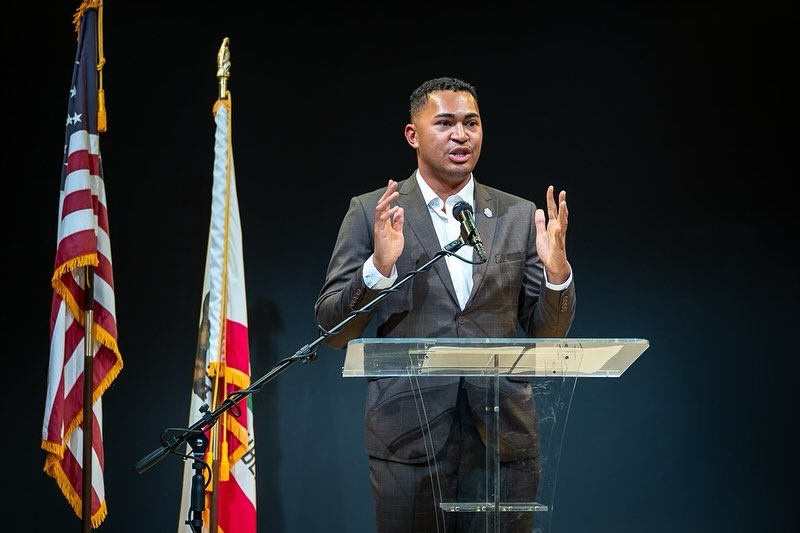
While most teenagers are busy playing video games, Triston Ezidore was busy making history.
From high school student to school board member for the Board of Education in Culver City, Ezidore talks with the LA Blade about his unconventional entry into politics with influence from George Floyd’s death and the COVID-19 pandemic, and how he made history twice while he was still a teenager.
In 2021, most of us were still at home and many people unemployed, out of school, caring for loved ones or just merely surviving the pandemic shutdowns and peak infections caused by COVID-19. During this time, many high school students lost valuable time in the classroom, being cut off from celebrating and socializing with their peers. Young Ezidore, rose above that—and more—achieving new milestones within his family and within the entire board of education in Culver City, bringing representation to queer, trans and communities of color.
Shortly after graduation, Ezidore headed to Syracuse University and from afar, he continued to tune into the Culver City school board meetings to track the progress he had made during his time as student body president in high school.
“I was still kind of watching, tuning into everything that was going on in Culver City and we knew that in order to get [the progress] right, we had to have a spotlight over the implementation,” said Ezidore.
It was during this time, that he noticed that all the progress he tried to implement during his time there, was not being implemented correctly, so he felt like it was his responsibility to track the movements a little more closely.
This is when he made the decision to return home and enroll at University of Southern California’s Dornsife College of Letters, Arts and Sciences—where he simultaneously launched his campaign for a seat on the Culver City Unified School District Board of Education.
In 2022—just one year after graduating high school—he won one of three open seats, becoming the youngest elected official in Los Angeles County at 19 years old. Then in 2023, he was elected to serve as School Board Vice President—making history as the first Black, gay man in that position as a teenager.
Though his journey into politics is “unconventional” as he puts it, Ezidore says he was radicalized to go into politics because of George Floyd’s death and the inequities made incredibly obvious by the COVID-19 pandemic.
Ezidore says that being the child of immigrants also inspired him to ultimately look into politics to gain a better understanding of how his perspective can be helpful towards other people’s experiences and educational goals.
His mother was born in Vietnam and moved to the United States after the fall of Saigon, which was the end of the Vietnam war that lasted from 1955 to 1975. Ezidore’s father is from Jamaica, so that gives Ezidore a unique perspective into the challenges and unique obstacles that many students face during their K-12 education.
Ezidore also identifies as gay and has been out since he was 18 years old.
“I find myself identifying as a gay, Black man, and I know that under this administration specifically, there has been an obsession with LGBTQ people and trans people in education,” said Ezidore. “I think historically our [education] system has not supported Black boys in education as a whole, so I find myself often pulling or tapping into those aspects of my identity.”
As a proud, gay, Black man, he felt that it was necessary to implement actual structures to support the most neglected demographic of the education system.
“We instituted the Black Student Achievement Plan that called for specific action goals to implement or to increase achievement,” said Ezidore.
This plan created mentorship and internship opportunities, a Black student council, a Black affinity group graduation and uplifted students in achieving their goals. During that time, former governor Jerry Brown stated that school districts should implement a Local Control and Accountability Plan (LACP). The plan serves as a tool to improve student outcomes with a roadmap that tracks and sets goals and plan actions, and leverages resources to guide students who were foster youth, low-income and English-learners.
“I don’t know that [Trump] is going to withhold the funding, but to me, I don’t know if I could sleep at night if I let him dictate these [educational] outcomes for the students in Culver City,” he said.
The latest update from the Supreme Court is that Trump is allowed to continue dismantling the U.S. Department of Education, worrying scholars throughout the country, with many saying that without an injunction, much of the damage can be irreversible. The Department of Education has already experienced the slashing of over 1,400 jobs and will continue to see more funding cuts due to the Reduction in Force (RIF) plan, implementing Trump’s Executive Order, which he claims will improve education and families by returning education authority to individual states.
-

 Bars & Parties5 days ago
Bars & Parties5 days agoSoCal queer singles come together as we celebrate LA’s Top Eligible LGBTQ Singles at the Abbey this Thursday!
-

 Theater4 days ago
Theater4 days ago‘Incitation to the Dance’ asks what happens to love when a younger man cuts in
-

 Puerto Rico5 days ago
Puerto Rico5 days agoBad Bunny shares Super Bowl stage with Ricky Martin, Lady Gaga
-

 New York4 days ago
New York4 days agoPride flag removed from Stonewall Monument as Trump targets LGBTQ landmarks
-

 Philippines4 days ago
Philippines4 days agoPhilippines Supreme Court rules same-sex couples can co-own property
-

 Los Angeles3 days ago
Los Angeles3 days agoStonewall Young Democrats bounces back from “quiet year” with Hero Awards
-

 Florida4 days ago
Florida4 days agoDisney’s Gay Days ‘has not been canceled’ despite political challenges
-

 Italy5 days ago
Italy5 days agoOlympics Pride House ‘really important for the community’
-

 Los Angeles1 day ago
Los Angeles1 day agoA new “queer summer camp” cycling event rises from the legacy of AIDS/LifeCycle
-

 a&e features22 hours ago
a&e features22 hours agoFrom ‘So Random’ to sexy theater: LA’s very own Mathew Scott Montgomery



